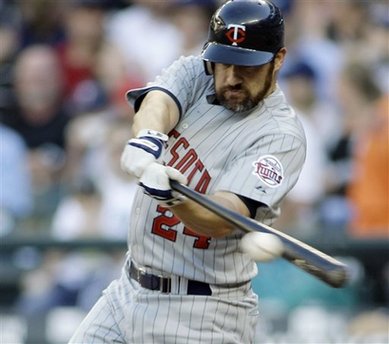August 27, 2008
Lamb Chopped
That total doesn't include another $6.5 million paid to those three players while they were actually on the team or $7.5 million spent on fellow free-agent busts Livan Hernandez and Adam Everett, whose contracts weren't eaten. Add it all up and the Twins committed $21 million to the veteran fivesome of Hernandez, Lamb, Rincon, Everett, and Monroe, each of whom were released (Monroe, Rincon, Lamb), dumped on another team (Hernandez), or benched after nearly being cut loose (Everett).
An inexplicable rebate on Hernandez courtesy of the Rockies drops that total to around $20 million, but the point remains. Not all five of those signings were likely to be disasters, although certainly anyone who read this blog during the offseason saw plenty of objections to the $11 million in contracts handed to Hernandez, Rincon, and Monroe. On the other hand, the $9 million spent on Lamb and Everett struck me as reasonable and those two signings turned out just as badly as the other three.
 Everett's value has always been completely dependent on his being an elite defensive shortstop, so season-long shoulder problems leaving him with a noodle arm go a long way toward explaining why he's been a bust. Lamb is the opposite in that his value has always come almost strictly from his bat, but unlike with Everett there's no simple explanation for why he suddenly ceased hitting. Prior to joining the Twins, Lamb spent four seasons with the Astros, hitting .281/.342/.464 in 1,435 plate appearances.
Everett's value has always been completely dependent on his being an elite defensive shortstop, so season-long shoulder problems leaving him with a noodle arm go a long way toward explaining why he's been a bust. Lamb is the opposite in that his value has always come almost strictly from his bat, but unlike with Everett there's no simple explanation for why he suddenly ceased hitting. Prior to joining the Twins, Lamb spent four seasons with the Astros, hitting .281/.342/.464 in 1,435 plate appearances.
That strong four-year run with Houston included Lamb hitting .289/.366/.453 in 353 plate appearances last season as a 31-year-old, yet he never showed anything resembling that sort of bat with the Twins. He started regularly at third base through mid-June, but lost the job to Brian Buscher after hitting just .226/.265/.305 in 211 trips to the plate. Lamb then spent the next two months as a little-used reserve, batting a total of 49 times in 10 weeks while hitting .267/.327/.400 (and growing a spectacular beard).
Signing Hernandez, Monroe, and Rincon all struck me as mistakes immediately, but bringing in Lamb and Everett seemed like reasonable decisions. Unfortunately, Hernandez, Monroe, and Rincon were as bad as expected, while Lamb stopped hitting and Everett stopped fielding to see their value vanish by both failing on the one side of the ball that they previously thrived. Lamb is far from the first mediocre veteran to prove worthless after joining the Twins of late, but he's a rare multi-year mistake.
Lamb is highly unlikely to be handed another starting job, but should find a bench spot somewhere. Hitting .233/.276/.322 in 261 plate appearances as a 32-year-old is ugly, but he'd be a decent reserve for a team that doesn't have left-handed hitters like Buscher and Justin Morneau starting at the infield corners. For the Twins, there's zero need for a left-handed hitter backing up Morneau and Buscher is essentially a younger, cheaper version of the player they thought they were getting in Lamb.
Lamb has hit .277/.334/.418 in 2,937 career plate appearances and has poor range with a decent arm at third base. Buscher has hit .288/.332/.392 in the majors and .280/.349/.404 in the minors, and has decent range with a poor arm at third base. Going with a 27-year-old version instead of a 32-year-old version makes lots of sense, but sadly it cost the Twins $6.6 million and 261 plate appearances in the process. After cutting Lamb, Ron Gardenhire pulled no punches assessing his time with the Twins:
His energy level wasn't what we expected. He's more of a veteran, laid-back guy, and we play at a different level. We like to run. We like to do all kinds of things. He's a veteran off-the-bench type of guy; that's what he looks like to me, and we were looking for something a little different. That's probably why it didn't work out.
Gardenhire usually takes that stance regarding young players rather than a veteran, but his suggesting that someone's personality is to blame for their struggles comes as no surprise. In reality, Lamb not hitting is "probably why it didn't work out." If he'd hit .289/.366/.453 like he did with the Astros last year, being a "laid-back guy" who doesn't "like to run" likely wouldn't have been an issue. To Lamb's credit, he handled the news and Gardenhire's subsequent comments pretty well:
I'm embarrassed for having gotten fired. I wish it had turned out better. Bill [Smith] and Rob [Antony] stuck their necks out for me. I hope it's not held against them. If [his laid-back attitude] was a problem, I wish someone would have told me. I would have thrown stuff if I needed to.
As a player who doesn't "battle his tail off" Lamb simply needed to hit, and he didn't.
Once you're done here, check out my latest "Daily Dose" column over at Rotoworld.

